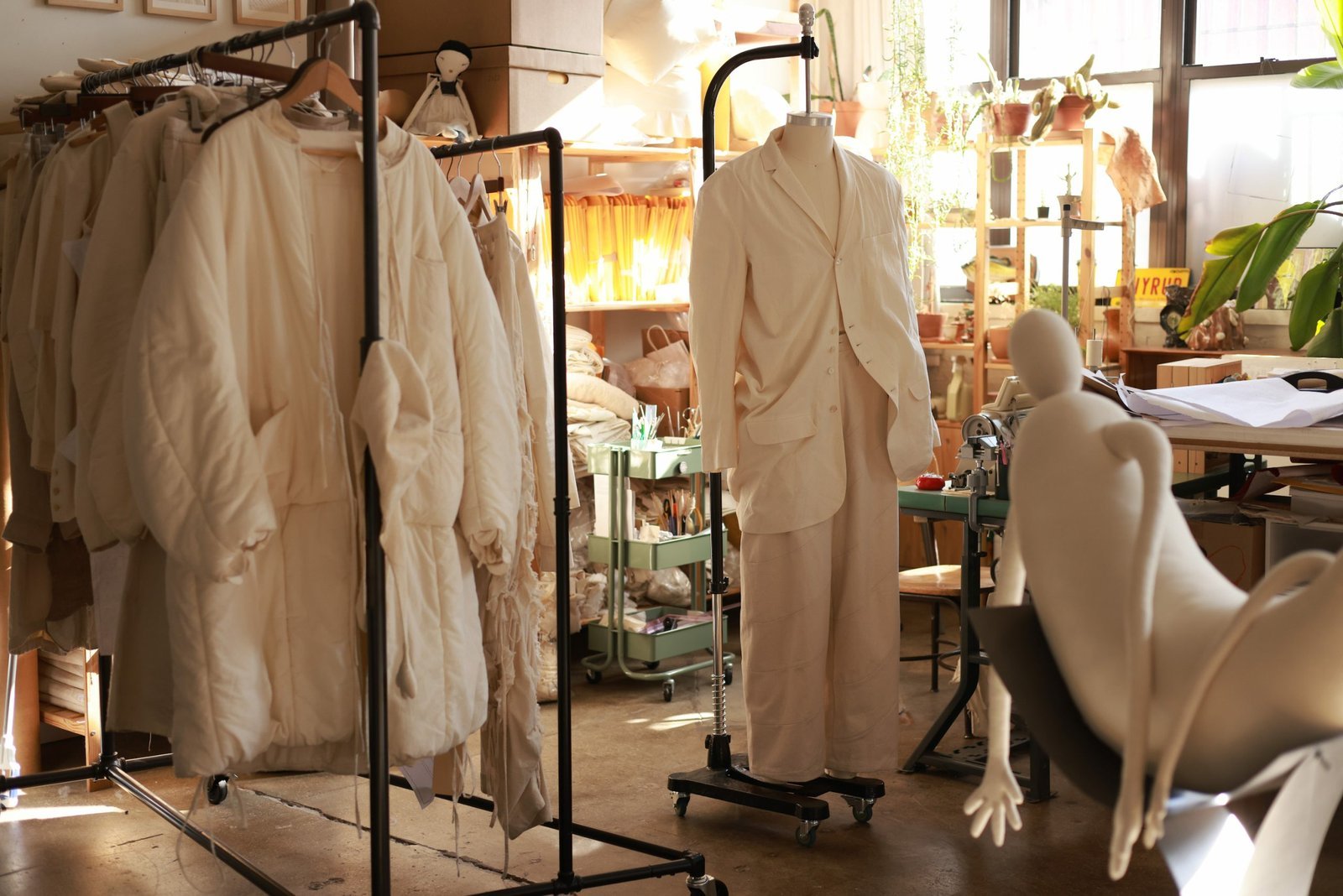In their sunlit Bushwick studio, where pristine white garments hang on display like dioramas in a natural history museum. Within,Lulu Wenjue LuandMichael Chufeng Fangare dexterously building inner worlds ofStudio Wenjüe Lu. Here, organic forms spill from windowsills, their shadows dancing across garments that seem to belong to another time and space. The scene evokes a fashion atelier transformed into a living, breathing laboratory full of wonder.
Their harmonious 2024 collection, titled "Aufhebung," or "sublation" in German, delves into the dynamic relationship between the body, garment, and sculpture. Hanging in the afternoon sun a shirt floats; its form your eye moves around looking for the best focal point. Its back bears a hand-sculpted spiral relief, the fabric manipulated into concentric circles that ripple outward like waves in still water. This piece embodies the collection's namesake—a Hegelian concept based in the metaphysics of history and logic that speaks simultaneously to preservation and transformation.
The studio, founded in 2020, began as an intimate dialogue between creators and a small circle of kindred spirits. What emerged was not just a clothing line but a growing community of individuals drawn to the studio's radical reimagining of what garments and their life cycle could be. "Each client shapes our evolution," Lulu explains, running her hand across a rack of pristine white pieces that seem to float between states of dress and sculpture. "Their experiences with the pieces, how the garments live and breathe with them—this becomes part of our design language."
[Error processing image]
In one corner, white sculptural forms—part mannequin, part art piece—stand in seemingly impossible poses, their limbs creating negative spaces that echo the fluid lines of the garments. These sculptures aren't only displays; they're conversation partners in the studio's ongoing exploration of form. A sleeve doesn't just house an arm; it questions what an arm could be. Working with materials like Kapok—a natural, unbleached fiber harvested from theKapok tree—and rare, artisanally-sourcedEgg White Cottonfirst appearing in their 2023 collection, Lulu and Michael design pieces that speak to something deeper than seasonal trends.
[Error processing image]
The studio's revolutionaryLifelong Mending Initiativeembodies this philosophy of Darwinian evolution. Rather than ending at the point of sale, each garment's story is just beginning. "We see clothing as a living entity that should grow and evolve with its wearer," Michael explains. "When a piece becomes damaged or stained, it's not the end—it's an opportunity for transformation." This commitment to perpetual renewal has fostered an unusual intimacy between studio and client, each damaged garment returning like a penned letter from a familiar friend.
[Error processing image]
At the heart of their practice lies the Taoist concept of "Unity between heaven and humanity" (天人合一), which manifests in every aspect of their work. Their garments, crafted from materials like indigenousDong Muslin, speak to this philosophy of interconnectedness. Each piece emerges from a deep consideration of form that transcends the conventional boundaries between clothing and sculpture, wearer and worn—space and time.
The studio's current collection, comprising twelve distinct looks each paired with corresponding soft sculptures, demonstrates this synthesis. TheSlanted ShirtandU Trouserschallenge not just conventional silhouettes but our very understanding of how clothing inhabits space. These pieces, crafted for what the studio terms "non-human forms," represent their philosophical embrace of post-humanism—garments that seem to exist in a state of perpetual becoming.
[Error processing image]
Their work has found an intellectual home atKomunein the Lower East Side, where their pieces hang alongside other boundary-pushing designers. YetStudio Wenjüe Lu'sapproach stands apart in its rejection of what they call "the gravity of accumulated possessions." Their "NEITHER" philosophy, a stance against a world "overly obsessed with labeling and hashtagging," manifests in garments that resist categorization in the fertile space between definition and possibility.
To capture the vision of the studio, the duo recently unveiledWiid, a fragrance that further dissolves traditional boundaries. Its name challenges the very definition of a weed—'the wild plants growing where it is not wanted and in competition with cultivated plants'—reflecting the studio's larger mission of re-contextualizing our relationship with the material world. Created in collaboration with perfumerYi Fei Li, the scent—equally at home on skin or as an ambient fragrance—captures their naturalistic ethos in olfactory form. Notes of cannabis extract and patchouli ground the experience in the organic world, while more ephemeral elements evoke the studio's preoccupation with transformation and impermanence.
[Error processing image]
As fashion grapples with its impact on the planet and its role in contemporary culture,Studio Wenjüe Luoffers a radical proposition: what if clothing could be both less and more than we've imagined? In their hands, sustainability eschews status as a marketing buzzword—it's a fundamental reimagining of our relationship with clothing.
In the "neither space" of their creation, they're crafting not just garments but a new vernacular for the relationship between fashion collection, consumer, and designer. Like the spiral relief catching afternoon light in their studio, their work suggests that perhaps the future of fashion lies not in endless novelty, but in a spiral of timeless evolution that nature itself exemplifies—one careful stitch, one returned garment, and one transformed piece at a time. To immersive yourself their world, visitwenjuelu.com.
